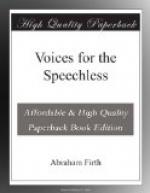HARRIET E. PAINE: Bird Songs of New England.
* * * * *
THE THRUSH.
Beside the cottage
in which Ellen dwelt
Stands a tall ash-tree; to
whose topmost twig
A thrush resorts, and annually
chants,
At morn and evening from that
naked perch,
While all the undergrove is
thick with leaves,
A time-beguiling ditty, for
delight
Of his fond partner, silent
in the nest.
“Ah why,”
said Ellen, sighing to herself,
“Why do not words, and
kiss, and solemn pledge,
And nature that is kind in
woman’s breast,
And reason that in man is
wise and good,
And fear of Him who is a righteous
Judge,—
Why do not these prevail for
human life,
To keep two hearts together,
that began
Their spring-time with one
love, and that have need
Of mutual pity and forgiveness,
sweet
To grant, or be received;
while that poor bird,—
Oh come and hear him!
Thou who hast to me
Been faithless, hear him,
though a lowly creature,
One of God’s simple
children that yet know not
The universal Parent, how
he sings
As if he wished the firmament
of heaven
Should listen, and give back
to him the voice
Of his triumphant constancy
and love;
The proclamation that he makes,
how far
His darkness doth transcend
our fickle light!”
WORDSWORTH.
* * * * *
THE AZIOLA.
“Do you not hear the
Aziola cry?
Methinks she must
be nigh,”
Said Mary, as
we sate
In dusk, ere stars were lit
or candles brought,
And I, who thought,
This Aziola was some tedious
woman,
Asked, “Who
is Aziola?” How elate
I felt to know that it was
nothing human,
No mockery of
myself to fear or hate;
And
Mary saw my soul,
And laughed and said, “Disquiet
yourself not,
’Tis nothing
but a little downy owl.”
Sad Aziola! many an eventide
Thy music I had
heard
By wood and stream, meadow
and mountain-side,
And fields and
marshes wide,
Such as nor voice, nor lute,
nor wind, nor bird,
The soul ever
stirred;
Unlike and far sweeter than
them all.
Sad Aziola! from
that moment I
Loved thee and thy sad cry.
SHELLEY.
* * * * *
THE MARTEN.
This
guest of summer,
The temple-haunting martlet,
does approve,
By his loved mansionry, that
the heaven’s breath
Smells wooingly here.
No jutty, frieze,
Buttress, nor coigne of vantage,
but this bird
Hath made his pendent bed,
and procreant cradle.
Where they most breed and
haunt, I have observed
The air is delicate.
Macbeth, Act 1, Sc. 6.




